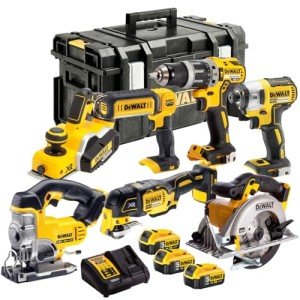12 Companies Leading The Way In Battery Powered Tool Set
페이지 정보
작성자 Ahmad 작성일25-10-07 05:48 조회13회 댓글0건관련링크
본문

Comprehensive Guide to Battery-Powered Tool Sets
Over the last few years, battery-powered tools have changed the way both specialists and DIY lovers approach their projects. With their benefit and efficiency, battery-powered tool sets have actually ended up being a staple in workshops nationwide. This blog site post looks into the advantages of battery-powered tools, important parts, contrasts, and answers to some regularly asked concerns.
Why Choose Battery-Powered Tool Sets?
Battery-powered tools offer numerous advantages over their corded counterparts:
Portability: Without the limitation of a cord, battery-powered tools can be quickly transferred and utilized anywhere.
Convenience: Quick setups eliminate the requirement for outlet gain access to, making them ideal for outside tasks.
Decreased Trip Hazards: The absence of cables allows for a much safer work area, especially in crowded or messy environments.
Technological Advancements: Most modern-day battery-powered tools feature effective lithium-ion batteries that provide longer runtimes and faster charging times.
Key Components of a Battery-Powered Tool Set
A common battery-powered tool set might consist of numerous tools customized to meet the requirements of various projects. Below is an extensive table showcasing standard tools discovered in these sets:
| Tool | Function | Common Battery Voltage | Common Brands |
|---|---|---|---|
| Drill/Driver | For drilling holes and driving screws | 12V to 20V | DEWALT, Makita, Milwaukee |
| Circular Saw | For cutting wood, plywood, and other products | 18V to 20V | Bosch, Ryobi, Black+Decker |
| Reciprocating Saw | For demolition and rough cuts in various materials | 18V | Porter-Cable, Hitachi |
| Effect Driver | For driving large screws/fasteners | 12V to 20V | Craftsman, Ridgid |
| Sander | For smoothing surface areas and ending up wood | 12V to 20V | Ryobi, Milwaukee |
| Angle Grinder | For cutting and grinding metal, masonry, and tiles | 18V | Makita, DEWALT |
| Jigsaw | For intricate cuts in wood, plastic, and metal | 12V to 20V | Black+Decker, Bosch |
Notable Features to Consider
When selecting a battery-powered tool set, a number of features can enhance use and efficiency:
Battery Life: Look for tools with lithium-ion batteries that provide longer runtimes and charge quickly.
Interchangeability: Some tool sets permit for battery compatibility across several tools, reducing the requirement for multiple batteries.
Weight: Consider the ergonomics; lighter tools can lower tiredness throughout substantial usage.
Resilience: Robust building and protective features (like dust and water resistance) make sure the longevity of the tools.
Warranty and Support: Good brand names typically provide guarantees that cover problems and offer customer assistance for questions.
Comparing Battery-Powered Tools to Corded Tools
The choice in between battery-powered and corded tools often comes down to personal preference and project requirements. Here's a comparison:
| Feature | Battery-Powered Tools | Corded Tools |
|---|---|---|
| Mobility | High - can be utilized anywhere | Limited - needs proximity to power outlets |
| Runtime | Limited by battery life | Constant as long as plugged in |
| Power Output | Usually less effective than corded | Typically more powerful |
| Maintenance | Needs battery care | Lower maintenance; more uncomplicated |
| Cost | Generally higher preliminary investment | More affordable for private tools |
| Versatility | Lots of multi-purpose tools available | Specialized tools offered |
Best Practices for Using Battery-Powered Tool Sets
To make the most out of a battery-powered tool set, follow these best practices:
Charge Batteries Regularly: To guarantee optimum battery life, prevent deep discharging and charge batteries after each usage.
Tidy Tools After Use: Keeping your tools clean lowers wear and tear and can help preserve their lifespan.
Store Safely: Keep tools in a dry, secure area to prevent damage and guarantee simple access.
Read User Manuals: Each tool may have particular operating guidelines or upkeep tips; reading the handbook can conserve time and frustration.
Frequently Asked Questions (FAQs)
1. The length of time do battery-powered tools last?
The lifespan of battery-powered tools depends upon use and maintenance but can last a number of years with appropriate care. Lithium-ion batteries typically last 2-3 years, depending on charging practices.
2. Can I utilize my battery-powered tools in winter?
Extreme cold can impact battery efficiency. It's best to keep batteries at space temperature when not in use and enable them to warm up before usage in cold conditions.
3. Are all battery-powered tools compatible with the exact same battery?
Not always. Battery compatibility often depends upon the brand and particular tool model. It's vital to confirm compatibility before acquiring additional tools.
4. How do I preserve lithium-ion batteries?
To keep lithium-ion batteries, prevent complete discharges, keep them cool, and charge them after use. It's also encouraged to use the producer's battery charger.
5. What are the most important tools for a beginner?
For beginners, a drill/driver, circular saw, and www.powertoolsonline.uk impact chauffeur are typically the most important tools to begin with, as they cover a vast array of basic tasks.
Battery-powered tool sets have actually changed how we approach conventional tasks, offering a mix of benefit and performance. Whether for expert trades or DIY home enhancements, these tools cater to varied task requirements. By comprehending the functions, components, and best practices connected with battery-powered tools, users can optimize their efficiency and performance. Armed with this comprehensive guide, both amateurs and skilled professionals can now make notified choices when choosing their next tool set.
댓글목록
등록된 댓글이 없습니다.
